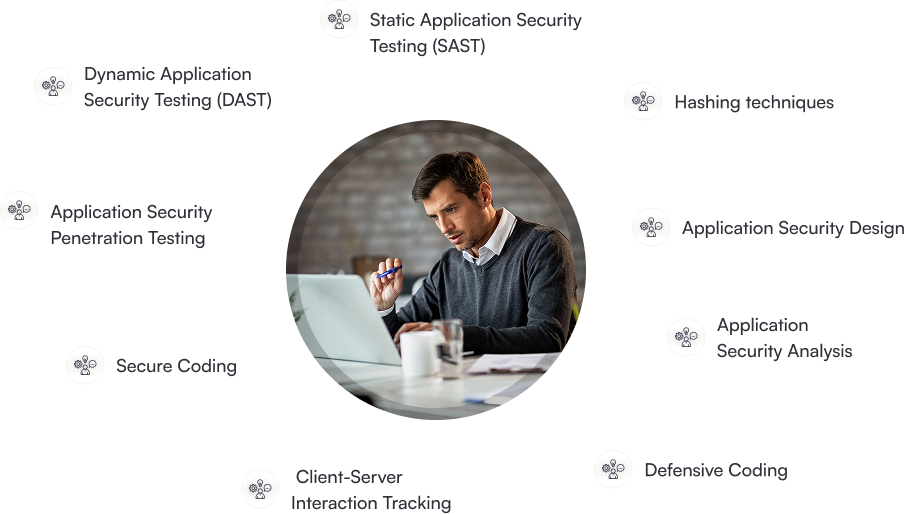SECURE PROGRAMMING
10 Weeks
Duration
Online
Mode of Study
Certified Application Security Engineer (CASE)
Certification
$465
Cost Per Credit Hour
Course Overview
This course equips you with in-depth knowledge of security activities across every phase of the Software Development Lifecycle (SDLC). You’ll gain expertise in selecting and applying effective security strategies, guidelines, and techniques for widely used software development environments.
Your career prospects and earning potential will be enhanced by upgrading your know-how of the latest application security trends, tools, and techniques. You’ll also boost your professional credibility with a valuable cybersecurity certification – Certified Application Security Engineer (CASE).


Admission Inquiry
"*" indicates required fields
Highlights of This Course

Cutting-Edge Courseware
10 modules featuring immersive video lectures and digital books for an in-depth understanding of every topic.

Virtual Labs
Simulate real-world scenarios for hands-on practice with the latest cybersecurity tools.

Quizzes
Engaging quizzes after each module that measure and reinforce your knowledge of the topics covered.

Discussions
Interactive discussion boards where you exchange ideas and views on the course topics with your peers and professors.

Essential Tools
Software tools that enhance your learning experience, such as Grammarly.

24x7 Online Library
Round-the-clock online library with an expansive collection of free-to-use learning resources.

Cybersecurity Certification
Includes EC-Council's world-renowned Certified Application Security Engineer (CASE) certification.
Why Pursue a Career in Application Security?
Market Growth
Soaring Demand
Earning Potential
Earning Potential
Weekly Modules
Week-1Module 1 – Application Security and Common Attacks
Attackers exploit application vulnerabilities to launch attacks and gain unauthorized access to resources. This module will help you understand the importance of application security and how to identify the most common application-level attacks.
Week-2Module 2 – Securing Applications in Software Development Life Cycle (SDLC)
In this module, you will learn about securing applications in all phases of the Software Development Life Cycle (SDLC), as software security requirements are non-functional and must be addressed to maintain an application’s confidentiality, integrity, and availability.
Week-3Module 3 – Secure Application Design Principles and Threat Modeling
In this module, you will learn about the importance of secure application design, discuss various secure design principles, and familiarize yourself with several Threat Modeling processes.
Week-4Module 4 – Implementing Secure Coding Practices
This module focuses on secure coding practices and defensive coding techniques to protect against SQL Injection Attacks, XSS Attacks, Parameter Tampering Attacks, and Directory Traversing Attacks.
Week-5Module 5 – Defensive Coding Techniques Against Different Attacks
This module will help you develop your knowledge of authentication and authorization in ASP.NET Core, MVC Learn, and Web Forms.
Week-6Module 6 – Session Management Techniques
In this module, you will learn about secure cryptographic practices and defensive coding methods against session hijacking attacks and discuss various session management techniques in ASP.NET Core.
Week-7Module 7 – Client-Server Interaction Tracking
In this module, you will learn about the various mechanisms for tracking entire interactions between client and server.
Week-8Module 8 – Information Disclosure and Error Handling
This module covers secure exception handling and defensive coding practices to prevent information disclosure errors.
Week-9Module 9 – Application Security Testing
In this module, you will study Static Application Security Testing (SAST), Dynamic Application Security Testing (DAST), and manual secure code review techniques for the most common vulnerabilities.
Week-10Module 10 – SAST, DAST, and Secure Deployment
In this module, you will implement defensive coding practices and perform SAST, DAST, and secure deployments.
What You Will Learn

- The importance of application security
- Most common application-level attacks
- Ways to secure software applications
- Secure software deployments
- Secure practices at the host, network, application, IIS, .NET, and SQL server levels
- Secure application architecture
- Secure coding practices
- Authentication and authorization defensive techniques
- Cryptographic practices
- Defensive coding practices
- Session management techniques
- Static Application Security Testing (SAST)
- Dynamic Application Security Testing (DAST)
Virtual Lab Exercises

Get hands-on practice with state-of-the-art cybersecurity tools in simulations that mirror real-world scenarios. The virtual lab exercises included in this CASE certification course cover software application security disciplines like demonstrating cross-site scripting vulnerability, preventing SQL injection attacks, protecting applications from path traversal attacks, mitigating unsecured cryptographic storage vulnerabilities with strong hashing techniques, performing Static Application Security Testing (SAST) and Dynamic Application Security Testing (DAST), and much more.
Skills You Will Gain


- Static Application Security Testing (SAST)
- Dynamic Application Security Testing (DAST)
- Hashing techniques
- Application Security Design
- Application Security Analysis
- Application Security Penetration Testing
- Secure Coding
- Defensive Coding
- Client-Server Interaction Tracking
Jobs You Can Prepare For
Application Security Engineer
Software Developer
Security Analyst
Penetration Tester
Security Consultant
DevSecOps Engineer
Security Architect
Application Security Consultant
Secure Code Reviewer
Security Auditor
… And Many More!
Total Course Fee
$1,395
- Cost Per Credit Hour: $465
- Technology Fee Per Term: $50
- Transcript Fee: $10 (plus shipping, if international)

Admission Criteria
- You must be aged 18 years or older.
- You must have a high school diploma (or equivalent), college degree, or relevant certification.
How to Apply
Step 01 :
Fill out the NDS application form and submit it to our Enrollment Advisor.
Step 02 :
Send us a scanned copy of your official government identification and documents showing proof of education.
Step 03 :
Pay the one-time $100 application fee.
Voices of Success: Hear from Our Alumni
Here’s what our students say about this CASE certification course and how it helped advance their cybersecurity careers.

Frequently Asked Questions
What is the CASE certification?
The Certified Application Security Engineer (CASE) certification equips you with the skills and knowledge required to create secure applications throughout the Software Development Lifecycle (SDLC). It’s a particularly useful certification for developers who build cyber security applications.
What qualifications do I need for the Certified Application Security Engineer (CASE) certification?
To enroll in EC-Council University’s Secure Programming non-degree course, you must be at least 18 years old and a high school graduate. After completing the course, you can attempt the Certified Application Security Engineer (CASE) certification exam.
How long does the CASE certification course take to complete?
EC-Council University’s Secure Programming non-degree course, which includes the Certified Application Security Engineer (CASE) certification, takes 10 weeks to complete.
